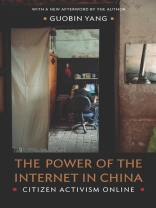Since the mid-1990s, the Internet has revolutionized popular expression in China, enabling users to organize, protest, and influence public opinion in unprecedented ways. Guobin Yang’s pioneering study maps an innovative range of contentious forms and practices linked to Chinese cyberspace, delineating a nuanced and dynamic image of the Chinese Internet as an arena for creativity, community, conflict, and control. Like many other contemporary protest forms in China and the world, Yang argues, Chinese online activism derives its methods and vitality from multiple and intersecting forces, and state efforts to constrain it have only led to more creative acts of subversion. Transnationalism and the tradition of protest in China’s incipient civil society provide cultural and social resources to online activism. Even Internet businesses have encouraged contentious activities, generating an unusual synergy between commerce and activism. Yang’s book weaves these strands together to create a vivid story of immense social change, indicating a new era of informational politics.
Зміст
List of Figures
List of Tables
Acknowledgments
Introduction
1. Online Activism in an Age of Contention
2. The Politics of Digital Contention
3. The Rituals and Genres of Contention
4. The Changing Style of Contention
5. The Business of Digital Contention
6. Civic Associations Online
7. Utopian Realism in Online Communities
8. Transnational Activism Online
Conclusion: China’s Long Revolution
Notes
Bibliography
Index
Про автора
Guobin Yang is an associate professor in the Department of Asian and Middle Eastern Cultures at Barnard College, Columbia University. He is coeditor, with Ching Kwan Lee, of
Re-envisioning the Chinese Revolution: The Politics and Poetics of Collective Memories in Reform China.







